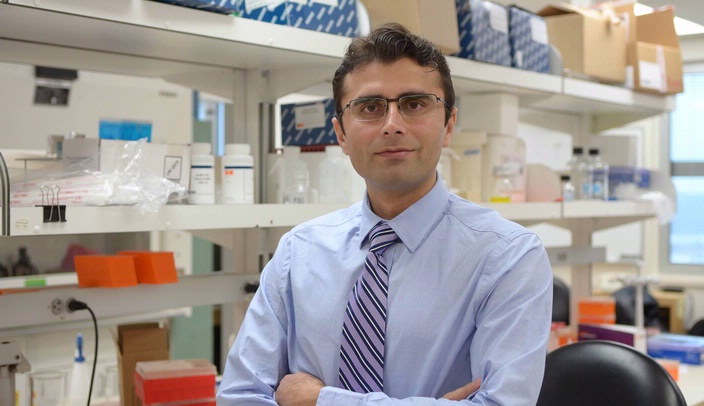Pankaj Singh, Ph.D., professor in the Eppley Institute for Research in Cancer and Allied Diseases at the University of Nebraska Medical Center, is the corresponding author of a paper published this month in the journal Cancer Cell.
Dr. Singh's paper is visible on the journal's website until Aug. 29. This is the first study published in the journal that originated from UNMC. Cancer Cell is a top-tier journal in the field of cancer research.
Pancreatic cancer strikes more than 53,000 people in the U.S. each year. The one-year survival rate of people with pancreatic cancer who do not have surgery is 29 percent and the five-year survival rate is 7 percent.
Poor survival in pancreatic cancer is due in part to modest response to the existing therapies. Current therapies include mimetics, drugs that imitate the natural compounds such as nucleosides that are used by the cancer cells for growth.
One such mimetic is gemcitabine, which has been used as a therapy, alone or in combination with other drugs, for decades. Studies from Dr. Singh's lab establish a novel, widely-prevalent mechanism describing how cancer cells respond poorly to therapy by developing resistance.
Resistance to gemcitabine is mediated by the H1F1 protein that changes how cancer cells take up nutrients and increases the levels of nucleosides in cancer cells. Such increased levels of nucleosides dilute the therapy levels in cancer cells and tumors respond poorly.
The study in Cancer Cell demonstrates that combining gemcitabine with other therapeutic treatments, specifically digoxin or leflunomide, will decrease resistance to therapy in pancreatic cancer patients.
Imaging for sugar uptake by tumors also demonstrates that pancreatic tumors with high sugar uptake respond poorly to chemotherapies and perhaps would benefit from the novel combination therapies tested in the manuscript in pre-clinical models.
The study was highlighted in the issue and received a special commentary from Chi Van Dang, M.D., Ph.D., an eminent scientist in the field of cancer biology.
"The published studies were truly inter- and intra-institutional collaborative studies and would not have been feasible without contributions from each of the basic and clinical investigators who are coauthors on the paper," Dr. Singh said. "I really appreciate the supportive research environment at the Fred & Pamela Buffett Cancer Center, especially the Specialized Program of Research Excellence (SPORE) leadership by Dr. Tony Hollingsworth and overall support by Dr. Ken Cowan."
Surendra Shukla, Ph.D., a research instructor in Dr. Singh’s lab and one of the three first authors on the study, said, “The research highlights the role of the mucin 1 (MUC1) protein in causing therapy resistance in pancreatic tumors. This protein is one of several mucin proteins that make up mucus, a slippery substance that lubricates and protects the lining of the airways, digestive system, reproductive system, and other organs and tissues.”
This research was supported by a grant through the American Association for Cancer Research (AACR) and the Pancreatic Cancer Action Network (PanCAN) as well as multiple National Cancer Institute grants.
The novel combination therapies explored in Dr. Singh's study soon will be tested in patients who enroll into clinical trials at UNMC.
Three UNMC oncologists – Jean Grem, M.D., Lyudmyla Berim, M.D., and Kelsey Klute, M.D. – will be enrolling patients in the trials.
"I am very optimistic about these trials," Dr. Singh said. "I expect that the proposed modifications to current chemotherapy strategies will improve survival in pancreatic cancer patients by increasing the efficacy and/or decreasing the toxicity by requiring smaller doses of chemotherapy strategies."
We are Nebraska Medicine and UNMC. Our mission is to lead the world in transforming lives to create a healthy future for all individuals and communities through premier educational programs, innovative research and extraordinary patient care.
